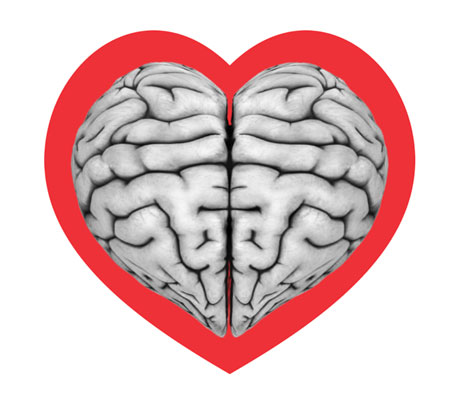It has been said that the brain is a most outstanding organ. (It manages most of your bodies' activities and processes information received from both outside and inside the body and is the very seat of our emotions and cognitive abilities, including thought, long- and short-term memory, and decision-making.)
It works for 24 hours a day, 365 days a year, right from your birth until you fall in love. Then your brain stops working and you behave like you are out of your mind.
Even highly intelligent people are known to do the craziest things when in love. They walk like on clouds for no other reason but the mere sight of their beloved. They do anything to spend every moment with their loved ones even at the expense of everything else. Like addicts, they can’t think of anything or want anything else but to be with their beloved. They see no fault in their dear ones often proving that “love is blind.” They are so focused on their loved ones that they lose control of their attention, become absent-minded and neglect almost everything else.
Lovers become “blind” to possible problems that may arise or what can go wrong in a relationship. They don’t stop to analyze the pros and cons of love before falling in it. They idealize their loved ones and see only things they want to see. Thus lovers are said to be “madly in love” or “crazy about each other” or “head over heels in love” or “crazy in love and out of their minds.”
For this article a number of happily married couples were interviewed by Canadian Filipino Net about their feelings when they fell in love. These quotes from husbands and wives revealed interesting insights about their experiences in love.
“It’s a mystery that is hard to explain but easy to feel with the right person at the right time.”
“It was like winning a 50-million dollar lottery!”
“Absolute joy here (thump thump) where the heart is.”
“The best part of falling in love was when she loved me back.”
“It settled my future. I knew I would be a family man when I fell in love.”
“It felt like some kind of chemistry was working within me.”
“It was chemistry! The mere touch of your hand was electrifying; made me shiver all over.”
“For many years I had an ideal girl in mind. When I finally met such a girl and we fell in love, it was like an impossible dream come true.”
“It is an emotional high; urges one to plunge happily into the unknown, no matter what.”
“What a relief! No more looking, dating and competing with other suitors. I have won!”
“Love is not a “brain” thing; it just happens for no rhyme or reason.”
“It is crazinesss, all right; nothing to do with logic or what is good or bad, right or wrong.”
“The thrill is in the chase.”
“A warm and tender feeling deep within you.”
A scientific explanation of what falling in love does to our body
“Falling in love causes our body to release a flood of feel-good chemicals that trigger specific physical reactions," said Pat Mumby, PhD, co-director of the Loyola Sexual Wellness Clinic and professor, Department of Psychiatry & Behavioral Neurosciences, Loyola University Chicago Stritch School of Medicine (SSOM). "This internal elixir of love is responsible for making our cheeks flush, our palms sweat and our hearts race.”
Levels of these substances, which include dopamine, adrenaline and norepinephrine, increase when two people fall in love. Dopamine creates feelings of euphoria while adrenaline and norepinephrine are responsible for the pitter-patter of the heart, restlessness and overall preoccupation that go along with experiencing love.
Doctors caution that these physical responses to love may work to our disadvantage because they make us blind to imperfections, problems and complications that may arise in a relationship. But it seems to prove that there is some scientific truth in the blindness of love.
"Love lowers serotonin levels, which is common in people with obsessive-compulsive disorders," said Mary Lynn, DO, co-director of the Loyola Sexual Wellness Clinic and assistant professor, Department of Obstetrics & Gynecology, SSOM. "This may explain why we concentrate on little other than our partner during the early stages of a courtship." This makes us addicted to love and our love object.
There are three phases of love, which include lust, attraction and attachment. Lust is a hormone-driven phase where we experience desire. Endorphins and hormones vasopressin and oxytocin also flood the body at this point creating an overall sense of well-being and security that is conducive to a lasting relationship making it possible for love to last a life time.
Do we love with our hearts or with our brains?
For a very long time, people believe that love resides in the heart because it is in the heart where we feel all love’s emotions. That is why the heart became the universally accepted symbol of love. It’s the heart that beats fast and loud at the mere thought of a loved one. It’s the heart that jumps with joy in the presence of love. And it’s the heart that suffers pain and longing when a loved one is absent or far away or uncaring.
With the advancement of science and a better understanding of how our body works, however, scientists are now absolutely sure that the heart has nothing to do with love: That the heart is just a strong muscle that pumps blood all over our body. That when we fall in love, blood flow increases in the pleasure center of the brain area and that’s what gives us the feeling of joy.
Dr. Fred Nour, a neurologist, sums it all up: “In 450 BC Hippocrates, known as the father of medicine, announced that emotions emanate from the brain, the very seat of all our emotions. He was right 2,500 year ago as he is today. Love comes from the brain and manifests itself in the heart. The heart is merely the servant of its master, the brain. It is the brain that tells the heart to beat fast, to make us blush and to feel good when we fall in love.” As the seat of all our emotions, the brain is also responsible for our negative feelings of jealousy, anger with our rivals for our lover’s affection and of possessiveness because we want our beloved just to ourselves.
Is this first Valentine’s Day in the 21st century the time to start vowing “I love you with all my brain” instead of “I love you with all my heart?” Should the heart, as a symbol of love, be replaced with a heart-shaped brain? Hallmark cards and lovers will decide. But from us all at CFNet, we now say: We love you, dear readers, with all our brains. May your love last a lifetime. HappyValentine’s Day.




